Report: Skills, Models, and Transition into Clinical Practice
VerifiedAdded on 2023/06/03
|8
|2103
|457
Report
AI Summary
This report examines the challenges and necessary skills for new graduate nurses transitioning into clinical practice. It highlights the anxieties and lack of confidence often experienced by new nurses, emphasizing the importance of both clinical skills (e.g., blood pressure measurement, skin care, bathing, feeding, and bed-making) and non-clinical skills (e.g., communication, critical decision-making, and teamwork). The report discusses Benner's five stages of clinical competence (Novice, Advanced Beginner, Competent, Proficient, and Expert) and Dreyfus's model of skill acquisition (Novice, Competent, Proficiency, and Expert), illustrating how nurses develop expertise over time. The author reflects on the skills gained through education and clinical placements, recognizing the need for continuous learning and adherence to professional standards. The report concludes by emphasizing the importance of confidence and the acquisition of various skills for a successful transition into the clinical environment.
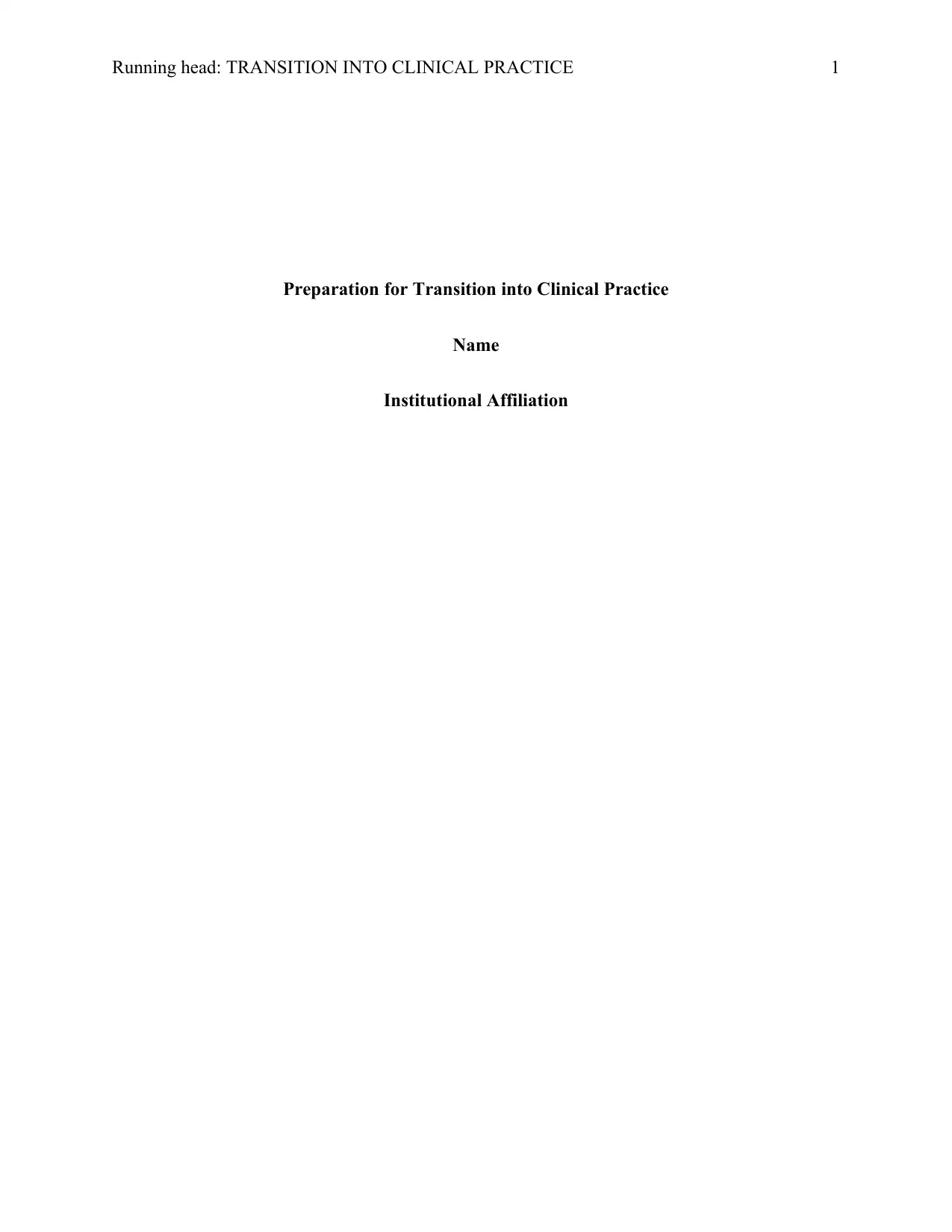
Running head: TRANSITION INTO CLINICAL PRACTICE 1
Preparation for Transition into Clinical Practice
Name
Institutional Affiliation
Preparation for Transition into Clinical Practice
Name
Institutional Affiliation
Paraphrase This Document
Need a fresh take? Get an instant paraphrase of this document with our AI Paraphraser
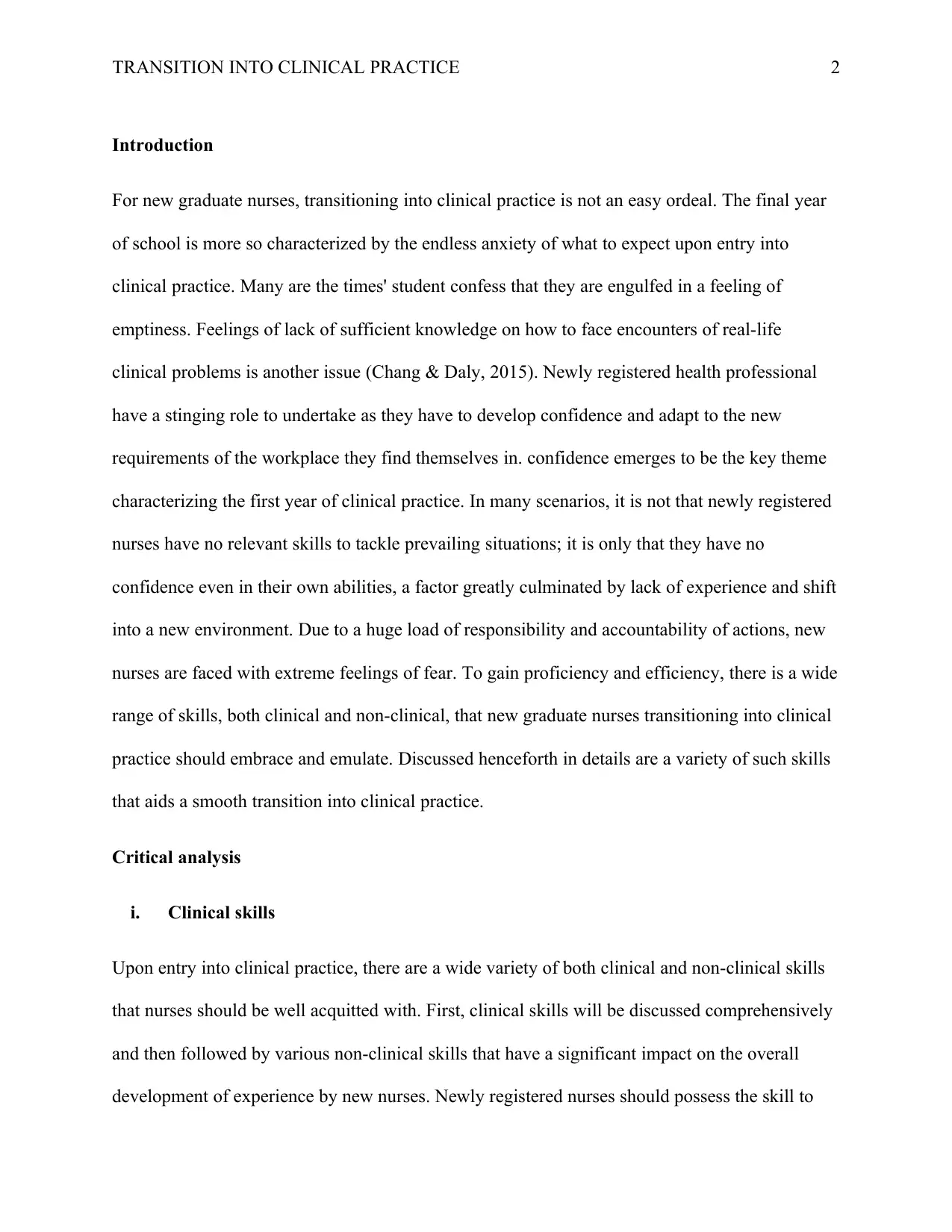
TRANSITION INTO CLINICAL PRACTICE 2
Introduction
For new graduate nurses, transitioning into clinical practice is not an easy ordeal. The final year
of school is more so characterized by the endless anxiety of what to expect upon entry into
clinical practice. Many are the times' student confess that they are engulfed in a feeling of
emptiness. Feelings of lack of sufficient knowledge on how to face encounters of real-life
clinical problems is another issue (Chang & Daly, 2015). Newly registered health professional
have a stinging role to undertake as they have to develop confidence and adapt to the new
requirements of the workplace they find themselves in. confidence emerges to be the key theme
characterizing the first year of clinical practice. In many scenarios, it is not that newly registered
nurses have no relevant skills to tackle prevailing situations; it is only that they have no
confidence even in their own abilities, a factor greatly culminated by lack of experience and shift
into a new environment. Due to a huge load of responsibility and accountability of actions, new
nurses are faced with extreme feelings of fear. To gain proficiency and efficiency, there is a wide
range of skills, both clinical and non-clinical, that new graduate nurses transitioning into clinical
practice should embrace and emulate. Discussed henceforth in details are a variety of such skills
that aids a smooth transition into clinical practice.
Critical analysis
i. Clinical skills
Upon entry into clinical practice, there are a wide variety of both clinical and non-clinical skills
that nurses should be well acquitted with. First, clinical skills will be discussed comprehensively
and then followed by various non-clinical skills that have a significant impact on the overall
development of experience by new nurses. Newly registered nurses should possess the skill to
Introduction
For new graduate nurses, transitioning into clinical practice is not an easy ordeal. The final year
of school is more so characterized by the endless anxiety of what to expect upon entry into
clinical practice. Many are the times' student confess that they are engulfed in a feeling of
emptiness. Feelings of lack of sufficient knowledge on how to face encounters of real-life
clinical problems is another issue (Chang & Daly, 2015). Newly registered health professional
have a stinging role to undertake as they have to develop confidence and adapt to the new
requirements of the workplace they find themselves in. confidence emerges to be the key theme
characterizing the first year of clinical practice. In many scenarios, it is not that newly registered
nurses have no relevant skills to tackle prevailing situations; it is only that they have no
confidence even in their own abilities, a factor greatly culminated by lack of experience and shift
into a new environment. Due to a huge load of responsibility and accountability of actions, new
nurses are faced with extreme feelings of fear. To gain proficiency and efficiency, there is a wide
range of skills, both clinical and non-clinical, that new graduate nurses transitioning into clinical
practice should embrace and emulate. Discussed henceforth in details are a variety of such skills
that aids a smooth transition into clinical practice.
Critical analysis
i. Clinical skills
Upon entry into clinical practice, there are a wide variety of both clinical and non-clinical skills
that nurses should be well acquitted with. First, clinical skills will be discussed comprehensively
and then followed by various non-clinical skills that have a significant impact on the overall
development of experience by new nurses. Newly registered nurses should possess the skill to
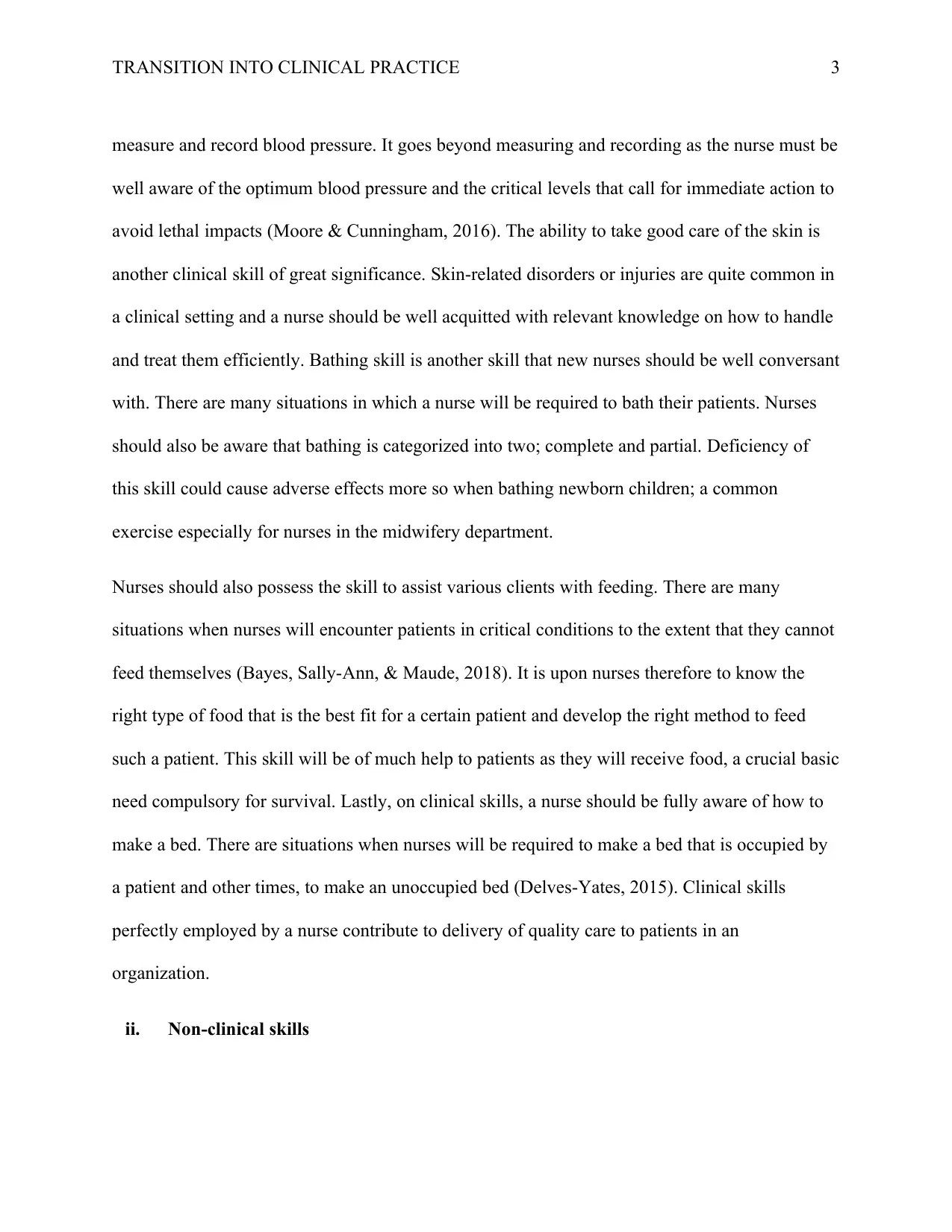
TRANSITION INTO CLINICAL PRACTICE 3
measure and record blood pressure. It goes beyond measuring and recording as the nurse must be
well aware of the optimum blood pressure and the critical levels that call for immediate action to
avoid lethal impacts (Moore & Cunningham, 2016). The ability to take good care of the skin is
another clinical skill of great significance. Skin-related disorders or injuries are quite common in
a clinical setting and a nurse should be well acquitted with relevant knowledge on how to handle
and treat them efficiently. Bathing skill is another skill that new nurses should be well conversant
with. There are many situations in which a nurse will be required to bath their patients. Nurses
should also be aware that bathing is categorized into two; complete and partial. Deficiency of
this skill could cause adverse effects more so when bathing newborn children; a common
exercise especially for nurses in the midwifery department.
Nurses should also possess the skill to assist various clients with feeding. There are many
situations when nurses will encounter patients in critical conditions to the extent that they cannot
feed themselves (Bayes, Sally-Ann, & Maude, 2018). It is upon nurses therefore to know the
right type of food that is the best fit for a certain patient and develop the right method to feed
such a patient. This skill will be of much help to patients as they will receive food, a crucial basic
need compulsory for survival. Lastly, on clinical skills, a nurse should be fully aware of how to
make a bed. There are situations when nurses will be required to make a bed that is occupied by
a patient and other times, to make an unoccupied bed (Delves-Yates, 2015). Clinical skills
perfectly employed by a nurse contribute to delivery of quality care to patients in an
organization.
ii. Non-clinical skills
measure and record blood pressure. It goes beyond measuring and recording as the nurse must be
well aware of the optimum blood pressure and the critical levels that call for immediate action to
avoid lethal impacts (Moore & Cunningham, 2016). The ability to take good care of the skin is
another clinical skill of great significance. Skin-related disorders or injuries are quite common in
a clinical setting and a nurse should be well acquitted with relevant knowledge on how to handle
and treat them efficiently. Bathing skill is another skill that new nurses should be well conversant
with. There are many situations in which a nurse will be required to bath their patients. Nurses
should also be aware that bathing is categorized into two; complete and partial. Deficiency of
this skill could cause adverse effects more so when bathing newborn children; a common
exercise especially for nurses in the midwifery department.
Nurses should also possess the skill to assist various clients with feeding. There are many
situations when nurses will encounter patients in critical conditions to the extent that they cannot
feed themselves (Bayes, Sally-Ann, & Maude, 2018). It is upon nurses therefore to know the
right type of food that is the best fit for a certain patient and develop the right method to feed
such a patient. This skill will be of much help to patients as they will receive food, a crucial basic
need compulsory for survival. Lastly, on clinical skills, a nurse should be fully aware of how to
make a bed. There are situations when nurses will be required to make a bed that is occupied by
a patient and other times, to make an unoccupied bed (Delves-Yates, 2015). Clinical skills
perfectly employed by a nurse contribute to delivery of quality care to patients in an
organization.
ii. Non-clinical skills
⊘ This is a preview!⊘
Do you want full access?
Subscribe today to unlock all pages.

Trusted by 1+ million students worldwide
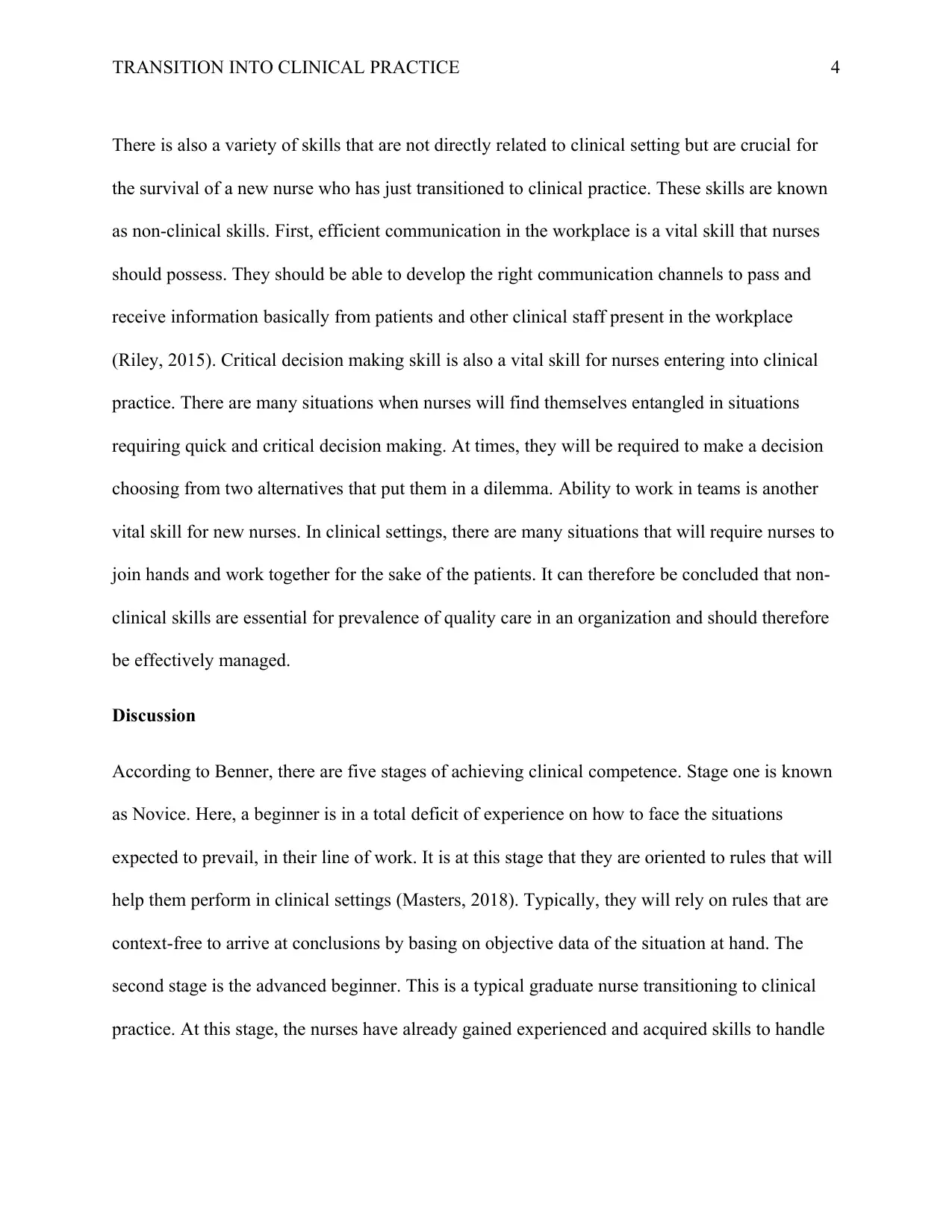
TRANSITION INTO CLINICAL PRACTICE 4
There is also a variety of skills that are not directly related to clinical setting but are crucial for
the survival of a new nurse who has just transitioned to clinical practice. These skills are known
as non-clinical skills. First, efficient communication in the workplace is a vital skill that nurses
should possess. They should be able to develop the right communication channels to pass and
receive information basically from patients and other clinical staff present in the workplace
(Riley, 2015). Critical decision making skill is also a vital skill for nurses entering into clinical
practice. There are many situations when nurses will find themselves entangled in situations
requiring quick and critical decision making. At times, they will be required to make a decision
choosing from two alternatives that put them in a dilemma. Ability to work in teams is another
vital skill for new nurses. In clinical settings, there are many situations that will require nurses to
join hands and work together for the sake of the patients. It can therefore be concluded that non-
clinical skills are essential for prevalence of quality care in an organization and should therefore
be effectively managed.
Discussion
According to Benner, there are five stages of achieving clinical competence. Stage one is known
as Novice. Here, a beginner is in a total deficit of experience on how to face the situations
expected to prevail, in their line of work. It is at this stage that they are oriented to rules that will
help them perform in clinical settings (Masters, 2018). Typically, they will rely on rules that are
context-free to arrive at conclusions by basing on objective data of the situation at hand. The
second stage is the advanced beginner. This is a typical graduate nurse transitioning to clinical
practice. At this stage, the nurses have already gained experienced and acquired skills to handle
There is also a variety of skills that are not directly related to clinical setting but are crucial for
the survival of a new nurse who has just transitioned to clinical practice. These skills are known
as non-clinical skills. First, efficient communication in the workplace is a vital skill that nurses
should possess. They should be able to develop the right communication channels to pass and
receive information basically from patients and other clinical staff present in the workplace
(Riley, 2015). Critical decision making skill is also a vital skill for nurses entering into clinical
practice. There are many situations when nurses will find themselves entangled in situations
requiring quick and critical decision making. At times, they will be required to make a decision
choosing from two alternatives that put them in a dilemma. Ability to work in teams is another
vital skill for new nurses. In clinical settings, there are many situations that will require nurses to
join hands and work together for the sake of the patients. It can therefore be concluded that non-
clinical skills are essential for prevalence of quality care in an organization and should therefore
be effectively managed.
Discussion
According to Benner, there are five stages of achieving clinical competence. Stage one is known
as Novice. Here, a beginner is in a total deficit of experience on how to face the situations
expected to prevail, in their line of work. It is at this stage that they are oriented to rules that will
help them perform in clinical settings (Masters, 2018). Typically, they will rely on rules that are
context-free to arrive at conclusions by basing on objective data of the situation at hand. The
second stage is the advanced beginner. This is a typical graduate nurse transitioning to clinical
practice. At this stage, the nurses have already gained experienced and acquired skills to handle
Paraphrase This Document
Need a fresh take? Get an instant paraphrase of this document with our AI Paraphraser
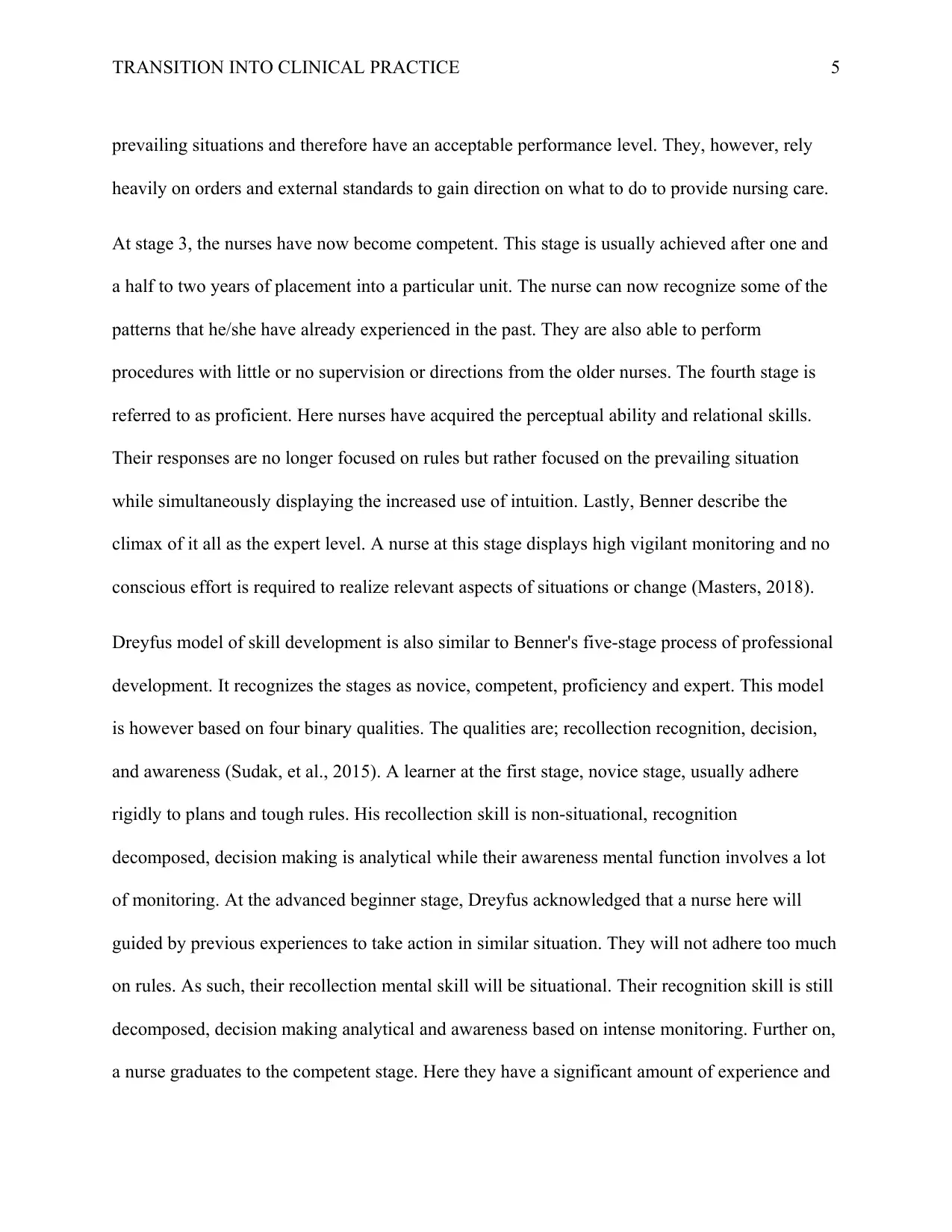
TRANSITION INTO CLINICAL PRACTICE 5
prevailing situations and therefore have an acceptable performance level. They, however, rely
heavily on orders and external standards to gain direction on what to do to provide nursing care.
At stage 3, the nurses have now become competent. This stage is usually achieved after one and
a half to two years of placement into a particular unit. The nurse can now recognize some of the
patterns that he/she have already experienced in the past. They are also able to perform
procedures with little or no supervision or directions from the older nurses. The fourth stage is
referred to as proficient. Here nurses have acquired the perceptual ability and relational skills.
Their responses are no longer focused on rules but rather focused on the prevailing situation
while simultaneously displaying the increased use of intuition. Lastly, Benner describe the
climax of it all as the expert level. A nurse at this stage displays high vigilant monitoring and no
conscious effort is required to realize relevant aspects of situations or change (Masters, 2018).
Dreyfus model of skill development is also similar to Benner's five-stage process of professional
development. It recognizes the stages as novice, competent, proficiency and expert. This model
is however based on four binary qualities. The qualities are; recollection recognition, decision,
and awareness (Sudak, et al., 2015). A learner at the first stage, novice stage, usually adhere
rigidly to plans and tough rules. His recollection skill is non-situational, recognition
decomposed, decision making is analytical while their awareness mental function involves a lot
of monitoring. At the advanced beginner stage, Dreyfus acknowledged that a nurse here will
guided by previous experiences to take action in similar situation. They will not adhere too much
on rules. As such, their recollection mental skill will be situational. Their recognition skill is still
decomposed, decision making analytical and awareness based on intense monitoring. Further on,
a nurse graduates to the competent stage. Here they have a significant amount of experience and
prevailing situations and therefore have an acceptable performance level. They, however, rely
heavily on orders and external standards to gain direction on what to do to provide nursing care.
At stage 3, the nurses have now become competent. This stage is usually achieved after one and
a half to two years of placement into a particular unit. The nurse can now recognize some of the
patterns that he/she have already experienced in the past. They are also able to perform
procedures with little or no supervision or directions from the older nurses. The fourth stage is
referred to as proficient. Here nurses have acquired the perceptual ability and relational skills.
Their responses are no longer focused on rules but rather focused on the prevailing situation
while simultaneously displaying the increased use of intuition. Lastly, Benner describe the
climax of it all as the expert level. A nurse at this stage displays high vigilant monitoring and no
conscious effort is required to realize relevant aspects of situations or change (Masters, 2018).
Dreyfus model of skill development is also similar to Benner's five-stage process of professional
development. It recognizes the stages as novice, competent, proficiency and expert. This model
is however based on four binary qualities. The qualities are; recollection recognition, decision,
and awareness (Sudak, et al., 2015). A learner at the first stage, novice stage, usually adhere
rigidly to plans and tough rules. His recollection skill is non-situational, recognition
decomposed, decision making is analytical while their awareness mental function involves a lot
of monitoring. At the advanced beginner stage, Dreyfus acknowledged that a nurse here will
guided by previous experiences to take action in similar situation. They will not adhere too much
on rules. As such, their recollection mental skill will be situational. Their recognition skill is still
decomposed, decision making analytical and awareness based on intense monitoring. Further on,
a nurse graduates to the competent stage. Here they have a significant amount of experience and
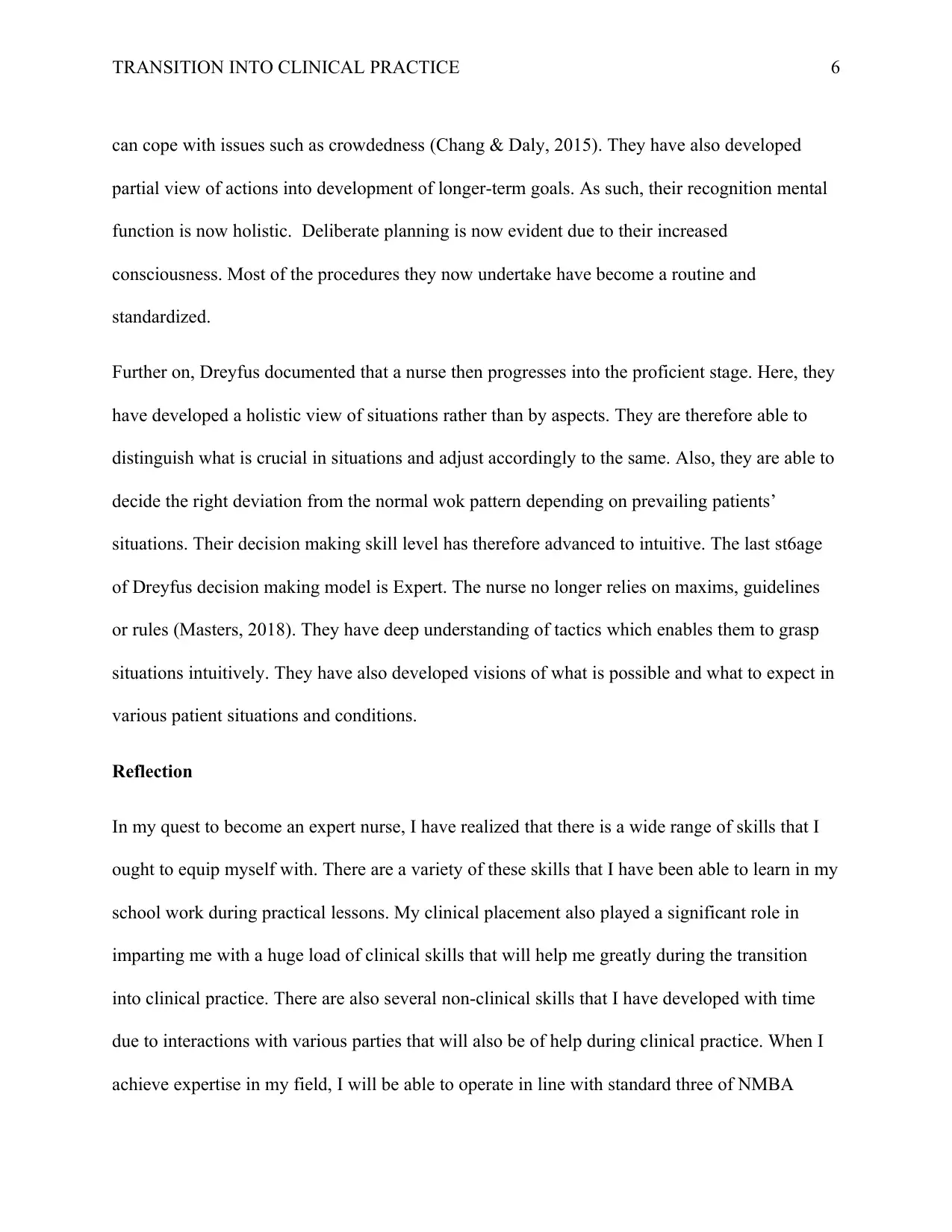
TRANSITION INTO CLINICAL PRACTICE 6
can cope with issues such as crowdedness (Chang & Daly, 2015). They have also developed
partial view of actions into development of longer-term goals. As such, their recognition mental
function is now holistic. Deliberate planning is now evident due to their increased
consciousness. Most of the procedures they now undertake have become a routine and
standardized.
Further on, Dreyfus documented that a nurse then progresses into the proficient stage. Here, they
have developed a holistic view of situations rather than by aspects. They are therefore able to
distinguish what is crucial in situations and adjust accordingly to the same. Also, they are able to
decide the right deviation from the normal wok pattern depending on prevailing patients’
situations. Their decision making skill level has therefore advanced to intuitive. The last st6age
of Dreyfus decision making model is Expert. The nurse no longer relies on maxims, guidelines
or rules (Masters, 2018). They have deep understanding of tactics which enables them to grasp
situations intuitively. They have also developed visions of what is possible and what to expect in
various patient situations and conditions.
Reflection
In my quest to become an expert nurse, I have realized that there is a wide range of skills that I
ought to equip myself with. There are a variety of these skills that I have been able to learn in my
school work during practical lessons. My clinical placement also played a significant role in
imparting me with a huge load of clinical skills that will help me greatly during the transition
into clinical practice. There are also several non-clinical skills that I have developed with time
due to interactions with various parties that will also be of help during clinical practice. When I
achieve expertise in my field, I will be able to operate in line with standard three of NMBA
can cope with issues such as crowdedness (Chang & Daly, 2015). They have also developed
partial view of actions into development of longer-term goals. As such, their recognition mental
function is now holistic. Deliberate planning is now evident due to their increased
consciousness. Most of the procedures they now undertake have become a routine and
standardized.
Further on, Dreyfus documented that a nurse then progresses into the proficient stage. Here, they
have developed a holistic view of situations rather than by aspects. They are therefore able to
distinguish what is crucial in situations and adjust accordingly to the same. Also, they are able to
decide the right deviation from the normal wok pattern depending on prevailing patients’
situations. Their decision making skill level has therefore advanced to intuitive. The last st6age
of Dreyfus decision making model is Expert. The nurse no longer relies on maxims, guidelines
or rules (Masters, 2018). They have deep understanding of tactics which enables them to grasp
situations intuitively. They have also developed visions of what is possible and what to expect in
various patient situations and conditions.
Reflection
In my quest to become an expert nurse, I have realized that there is a wide range of skills that I
ought to equip myself with. There are a variety of these skills that I have been able to learn in my
school work during practical lessons. My clinical placement also played a significant role in
imparting me with a huge load of clinical skills that will help me greatly during the transition
into clinical practice. There are also several non-clinical skills that I have developed with time
due to interactions with various parties that will also be of help during clinical practice. When I
achieve expertise in my field, I will be able to operate in line with standard three of NMBA
⊘ This is a preview!⊘
Do you want full access?
Subscribe today to unlock all pages.

Trusted by 1+ million students worldwide
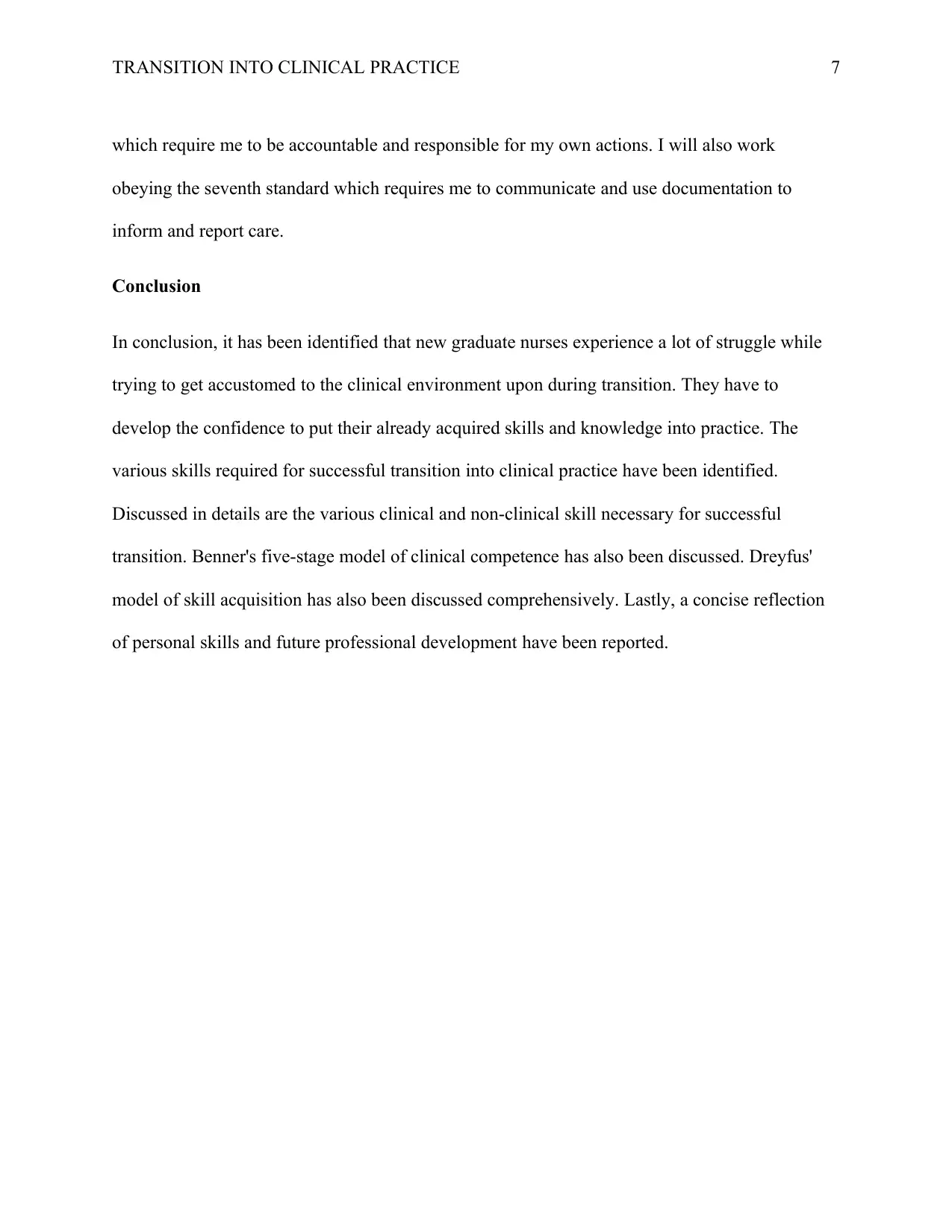
TRANSITION INTO CLINICAL PRACTICE 7
which require me to be accountable and responsible for my own actions. I will also work
obeying the seventh standard which requires me to communicate and use documentation to
inform and report care.
Conclusion
In conclusion, it has been identified that new graduate nurses experience a lot of struggle while
trying to get accustomed to the clinical environment upon during transition. They have to
develop the confidence to put their already acquired skills and knowledge into practice. The
various skills required for successful transition into clinical practice have been identified.
Discussed in details are the various clinical and non-clinical skill necessary for successful
transition. Benner's five-stage model of clinical competence has also been discussed. Dreyfus'
model of skill acquisition has also been discussed comprehensively. Lastly, a concise reflection
of personal skills and future professional development have been reported.
which require me to be accountable and responsible for my own actions. I will also work
obeying the seventh standard which requires me to communicate and use documentation to
inform and report care.
Conclusion
In conclusion, it has been identified that new graduate nurses experience a lot of struggle while
trying to get accustomed to the clinical environment upon during transition. They have to
develop the confidence to put their already acquired skills and knowledge into practice. The
various skills required for successful transition into clinical practice have been identified.
Discussed in details are the various clinical and non-clinical skill necessary for successful
transition. Benner's five-stage model of clinical competence has also been discussed. Dreyfus'
model of skill acquisition has also been discussed comprehensively. Lastly, a concise reflection
of personal skills and future professional development have been reported.
Paraphrase This Document
Need a fresh take? Get an instant paraphrase of this document with our AI Paraphraser
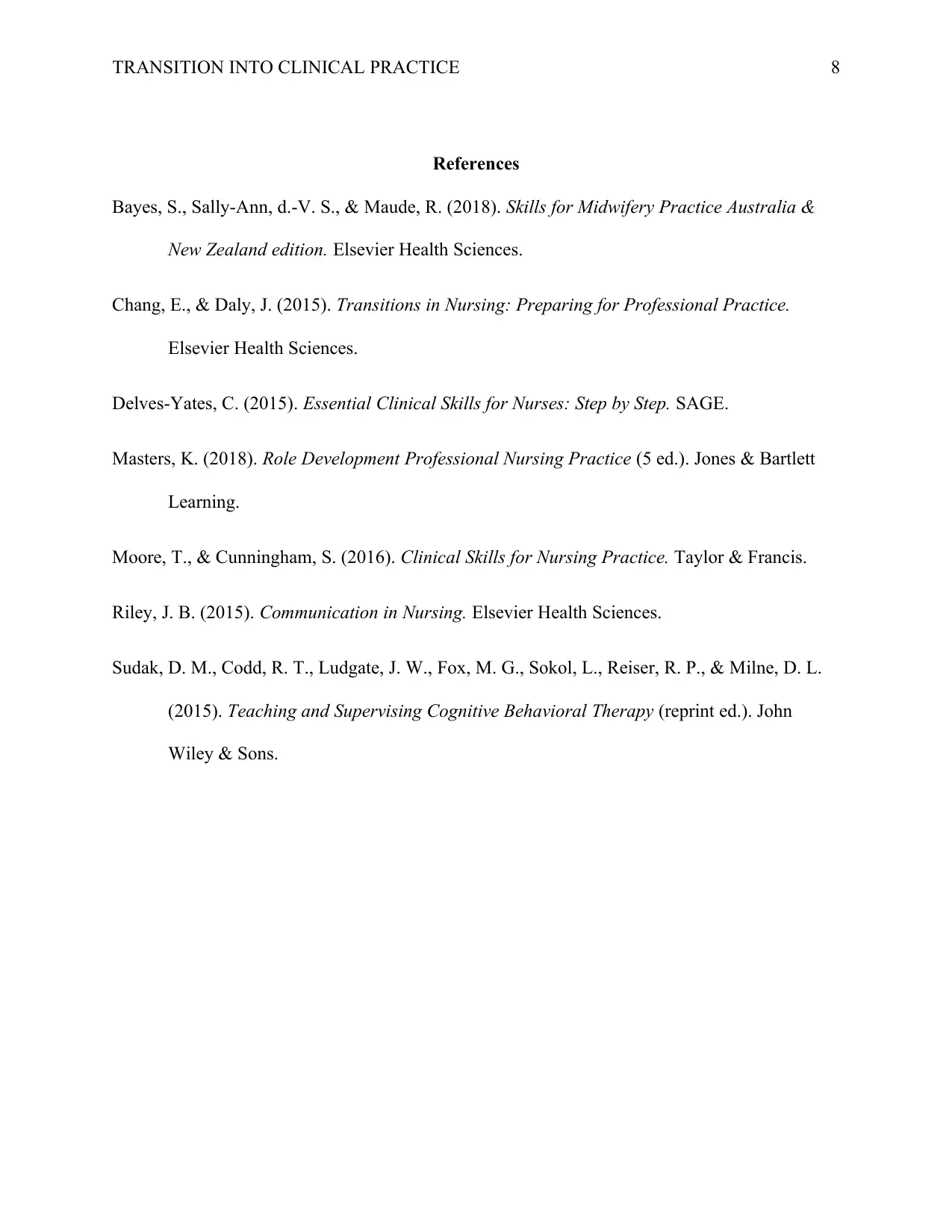
TRANSITION INTO CLINICAL PRACTICE 8
References
Bayes, S., Sally-Ann, d.-V. S., & Maude, R. (2018). Skills for Midwifery Practice Australia &
New Zealand edition. Elsevier Health Sciences.
Chang, E., & Daly, J. (2015). Transitions in Nursing: Preparing for Professional Practice.
Elsevier Health Sciences.
Delves-Yates, C. (2015). Essential Clinical Skills for Nurses: Step by Step. SAGE.
Masters, K. (2018). Role Development Professional Nursing Practice (5 ed.). Jones & Bartlett
Learning.
Moore, T., & Cunningham, S. (2016). Clinical Skills for Nursing Practice. Taylor & Francis.
Riley, J. B. (2015). Communication in Nursing. Elsevier Health Sciences.
Sudak, D. M., Codd, R. T., Ludgate, J. W., Fox, M. G., Sokol, L., Reiser, R. P., & Milne, D. L.
(2015). Teaching and Supervising Cognitive Behavioral Therapy (reprint ed.). John
Wiley & Sons.
References
Bayes, S., Sally-Ann, d.-V. S., & Maude, R. (2018). Skills for Midwifery Practice Australia &
New Zealand edition. Elsevier Health Sciences.
Chang, E., & Daly, J. (2015). Transitions in Nursing: Preparing for Professional Practice.
Elsevier Health Sciences.
Delves-Yates, C. (2015). Essential Clinical Skills for Nurses: Step by Step. SAGE.
Masters, K. (2018). Role Development Professional Nursing Practice (5 ed.). Jones & Bartlett
Learning.
Moore, T., & Cunningham, S. (2016). Clinical Skills for Nursing Practice. Taylor & Francis.
Riley, J. B. (2015). Communication in Nursing. Elsevier Health Sciences.
Sudak, D. M., Codd, R. T., Ludgate, J. W., Fox, M. G., Sokol, L., Reiser, R. P., & Milne, D. L.
(2015). Teaching and Supervising Cognitive Behavioral Therapy (reprint ed.). John
Wiley & Sons.
1 out of 8
Related Documents
Your All-in-One AI-Powered Toolkit for Academic Success.
+13062052269
info@desklib.com
Available 24*7 on WhatsApp / Email
![[object Object]](/_next/static/media/star-bottom.7253800d.svg)
Unlock your academic potential
Copyright © 2020–2026 A2Z Services. All Rights Reserved. Developed and managed by ZUCOL.




